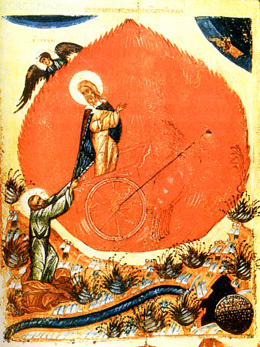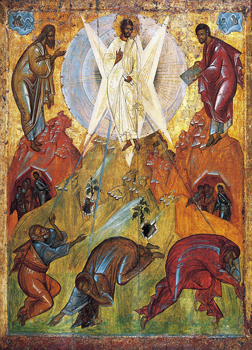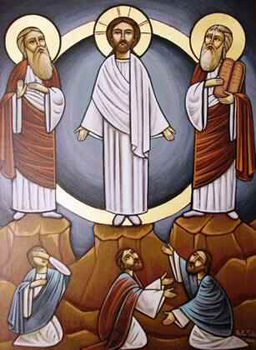For Sunday February 11, 2018
Transfiguration Sunday (The Last Sunday After the Epiphany)
Lectionary Readings (Revised Common Lectionary, Year B)
2 Kings 2:1-12
Psalm 50:1-6
2 Corinthians 4:3-6
Mark 9:2-9
Fiery chariots. Dazzling clothes. Magic mantles. Blinding clouds. It's Transfiguration Sunday, the apex of the liturgical season we call Epiphany, and our lectionary readings for the week are full of mind-bending wonders. Elijah ascends to heaven in a whirlwind, and Jesus transfigures on a mountaintop. There’s nothing subtle about these spectacular stories; today we stand with undimmed eyes and witness God’s glory in its fullness.
But here’s the odd thing: these are not happy stories. As miraculous and light-filled as they are, each story is laced with confusion, loss, and sorrow. Why? Because embedded in each is a threshold. A boundary line marking both a beginning and an end. And let’s face it: we human beings rarely approach thresholds without hesitation. Sometimes we cross over with ambivalence, glancing back over our shoulders with uncertainty and nostalgia. Sometimes, we refuse to cross over at all. But what these stories teach us is that thresholds are absolutely essential to the life of faith. Crossing over is what keeps our faith dynamic. Without thresholds, without evolution, without movement, we’ll die.
To appreciate what’s at stake in this week’s Old Testament reading, we need some backstory. In 2nd Kings, we learn that Elijah calls Elisha as his heir and acolyte when Elisha is still a young man, dutifully plowing his father's fields. Directed by God, Elijah walks out into the muddy fields, wraps his cloak around Elisha's shoulders, and calls him away to a new vocation.
Seven or eight good years go by. During this time, Elisha becomes Elijah's shadow, following his teacher around out of love, admiration, and a keen eagerness to learn anything his mentor will teach him. Their bond is so strong and so well known that when the time draws near for their parting, Elijah and the established community of prophets try in concert to help Elisha say goodbye.
 |
"I need to take the next step of this journey alone," Elijah tells his acolyte three separate times in this week’s reading. "No, I will not leave you," Elisha stubbornly insists, clinging all the harder. "Do you know the Lord is about to take your master?" the other prophets ask Elisha, hoping he'll accept the inevitable before it's too late. "Shut up!" is Elisha's gracious reply.
Elisha reacts as we might if we were standing upon a threshold — a threshold of vocation, of identity, and of relationship. Everything he has known is about to change, and he is filled with pain and bewilderment. Can he trust his calling in the absence of Elijah's reassuring presence? Can he learn to decipher the voice of God on his own, without an experienced translator at his side? Can he, a loyal and eager follower, become a leader instead?
I imagine these are questions we understand too well. Regardless of the particulars, we all know what it’s like to get used to one way of being in the world. One way of knowing God, one way of practicing our vocations, one way of relating to our families, one way of “doing” church. By the time Elijah’s ascension draws near, his student Elisha is well entrenched in finding both his God and his purpose through his mentor. He can’t bear the thought of having that safety net ripped away. Who will God become in Elijah’s absence? Who will Elisha become, if he is forced to step into spiritual adulthood? If he is forced to evolve?
In this story — as in our lives — there is no way to avoid the thresholds that God appoints. The chariots come, the whirlwind descends, and Elijah leaves. Looking back across the centuries that separate me from this fiery display of God's power, I wonder: what did the drama accomplish? The fire, the wind, the horses? Were the fireworks for Elijah, headed anyway to heaven and all its cosmos-altering wonders? Or was Elisha the one who needed to understand, right from the beginning of his career, that God's glorious unveilings come at a price? That epiphanies aren't be-alls and cure-alls? Elisha saw glory, that's for sure. But he also saw a point of no return, and his response was neither certitude nor joy. He tore his clothes and grieved.
 |
I know few scenes in the Bible more poignant than the one that ends this story. As quickly as the vision comes, it departs again. There is no afterglow, no surge of prophetic authority or knowledge as Elisha lies grieving in the dust. Only silence. Only loss. Only questions.
Why? Because it's not the vision that saves Elisha. The vision is glorious, of course, but divine wonders alone can’t save anyone. Elisha's salvation comes in the long silence after the glory. It comes when he still has no idea whether Elijah's "double portion" will rest on him, or not. It comes when he chooses to stand up, shoulder his grief, take up his teacher’s mantle, and cross the threshold into a new and unfamiliar life.
It’s clear from the details in the story that this choice is neither easy nor inevitable. But the decision Elisha makes bears witness to the faith epiphanies can forge in us when we make the hard choice to cross over. A battered faith, a trembling faith, a scorched faith. The faith that yields abundant life.
The second threshold story in this week’s readings — that of Jesus’s Transfiguration — is recorded in all three Synoptic Gospels. Over the centuries, it has steadily accumulated meanings — most of them thickly theological. Growing up, I was taught that the Transfiguration is important because it reveals Christ's divine nature, foreshadows his death, secures his place in the stream of Israel's salvific history, and prefigures his Resurrection.
All of this is true and no doubt important. But for me, the story pivots around Peter, James, and John, the three terrified disciples who witness Jesus’s transfiguration and just about lose their minds.
Like Elisha, these friends of Jesus have spent years following him around, listening to his teachings, and witnessing his miracles. By the time Jesus invites them to the mountaintop, they have perfectly good reason to believe they know their Master. They know him as a teacher, a storyteller, a healer, and a traveling companion. His face, his manners, his mission — all are familiar to them. Familiar, endearing, and safe.
 |
But then, on the mountain, the unimaginable happens. Before their very eyes, Jesus changes, becoming at once both fully himself and fully unrecognizable. And suddenly, just like Elisha, Jesus’s stunned disciples find themselves standing upon a threshold. The man they thought they knew is suddenly more, suddenly Other. And the path he's walking — towards Jerusalem and death — is suddenly far grimmer than they could ever have imagined.
In other words, one phase of their life with Jesus is ending. What will it look like to begin another? They have journeyed with Jesus the minister, the rabbi, the healer. Will they now journey with him towards the cross? Or will they insist — as Peter briefly does in his fear and confusion — on remaining exactly where they are, sedentary and safe?
On Transfiguration Sunday, we come to the end of another liturgical season. Having seen the light of Epiphany, we prepare now for the long shadows of Lent. I don't know what thresholds we’ll encounter in the wilderness. I don’t know how God might invite us to change, to grow, to cross over. And I don’t know what losses and sorrows those crossings will include. But if this week’s stories bear witness to something true about the life of faith, then we can trust in the One who invites us to cross over. We can trust that resurrection awaits us on the other side.
Image credits: (1) Wikipedia.org; (2) Wikipedia.org; and (3) Pinimg.com.





